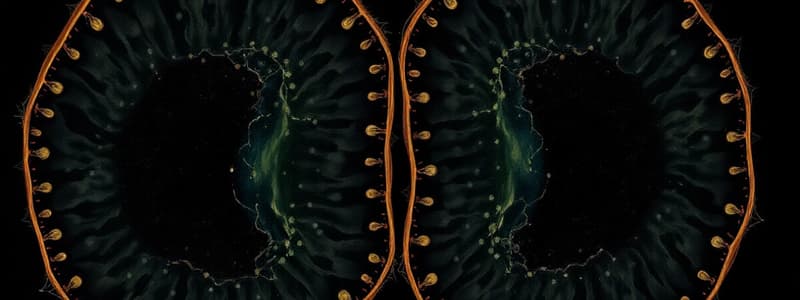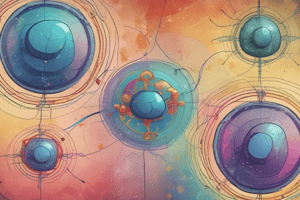Podcast
Questions and Answers
What is the primary purpose of the cell cycle in eukaryotic organisms?
What is the primary purpose of the cell cycle in eukaryotic organisms?
- To duplicate a eukaryotic cell into two genetically identical daughter cells (correct)
- To transport nutrients across cell membranes
- To eliminate damaged cells through necrosis
- To generate energy for cellular processes
What event occurs during cytokinesis?
What event occurs during cytokinesis?
- Chromosomes are replicated
- Nuclear division takes place
- Cell senescence is initiated
- The cytoplasm divides (correct)
Which of the following is a potential outcome of disrupted cell division?
Which of the following is a potential outcome of disrupted cell division?
- Development of dysplasia (correct)
- Increased tissue repair
- Enhanced apoptosis rates
- Heightened normal cell growth
What role do 'suicide genes' play in cell division?
What role do 'suicide genes' play in cell division?
What condition is characterized by tissue wasting due to cell degeneration?
What condition is characterized by tissue wasting due to cell degeneration?
What is hyperplasia primarily characterized by?
What is hyperplasia primarily characterized by?
During which phase of the cell cycle does DNA replication occur?
During which phase of the cell cycle does DNA replication occur?
Which statement accurately describes the G1 phase?
Which statement accurately describes the G1 phase?
What is the main function of centrioles during the G2 phase?
What is the main function of centrioles during the G2 phase?
Which phase of mitosis is characterized by the separation of chromosomes?
Which phase of mitosis is characterized by the separation of chromosomes?
What occurs during cytokinesis?
What occurs during cytokinesis?
Which checkpoint is considered crucial for the regulation of the G1 phase?
Which checkpoint is considered crucial for the regulation of the G1 phase?
Which of the following is NOT true about interphase?
Which of the following is NOT true about interphase?
What is the result of a disruption in the balance between cell division and cell death?
What is the result of a disruption in the balance between cell division and cell death?
What characterizes the cell cycle in eukaryotic organisms?
What characterizes the cell cycle in eukaryotic organisms?
Which of the following correctly describes apoptosis?
Which of the following correctly describes apoptosis?
What is the main reason for the existence of a finite number of cell divisions in human cells?
What is the main reason for the existence of a finite number of cell divisions in human cells?
Which term describes the presence of additional abnormal cells within a tissue?
Which term describes the presence of additional abnormal cells within a tissue?
What can occur if precise and accurate DNA replication is not achieved during the S phase?
What can occur if precise and accurate DNA replication is not achieved during the S phase?
During which phase are the organelles duplicated and the cell prepares for DNA replication?
During which phase are the organelles duplicated and the cell prepares for DNA replication?
Which of the following best describes the process of karyokinesis?
Which of the following best describes the process of karyokinesis?
In the context of interphase, what is the main role of the G2 phase?
In the context of interphase, what is the main role of the G2 phase?
What is the significance of checkpoints during the interphase?
What is the significance of checkpoints during the interphase?
What characterizes the mitotic phase in cell division?
What characterizes the mitotic phase in cell division?
What is the average duration of the G1 phase in a typical 24-hour cell cycle?
What is the average duration of the G1 phase in a typical 24-hour cell cycle?
What is the function of organelle duplication during the G1 phase of interphase?
What is the function of organelle duplication during the G1 phase of interphase?
Flashcards are hidden until you start studying
Study Notes
Cell Division
- The process by which a eukaryotic cell replicates into two identical daughter cells
- Consists of nuclear division (mitosis) and cytoplasmic division (cytokinesis)
- Essential for replacing dead or injured cells and tissue growth
- A human develops from 1 cell to approximately 75 trillion cells
Cell Growth and Division are Tightly Controlled
- A controlled sequence of events
- Cells have a finite number of divisions
- Cell death is controlled by activation of 'suicide genes'
- Approximately 50-70 billion cells die daily via apoptosis in an average adult
- A delicate balance exists between cell division and cell death
- Atrophy is the degeneration of cells leading to tissue wasting
- Dysplasia is the presence of abnormal cells in a tissue, possibly a precursor to cancer
- Hyperplasia is the enlargement of an organ or tissue due to increased cell reproduction, also potentially a precursor to cancer
Cell Division - Mitosis
- Cells replicate all of their chromosomes before division
- Two main stages: Interphase (non-dividing phase) and Mitotic Phase (dividing phase)
Interphase
- The phase between two mitotic divisions
- The cell grows and prepares for division
- Subdivided into G1, S and G2 phases
- The busiest and longest stage in the cell cycle
- Key checkpoints in this stage
- Most cells spend little time dividing
- Cells in G0 are not dividing or preparing to divide (e.g., neurons)
G1 Phase
- Cell growth and preparation for DNA replication
- Requires growth factors
- A key checkpoint stage
- Lasts about 8-10 hours in a 24-hour cycle
- High rate of metabolism, protein synthesis, and organelle duplication
S Phase
- DNA replication
- Lasts about 8 hours
- Precise and accurate replication is crucial to prevent genetic abnormalities
G2 Phase
- Continues preparation for cell division
- Synthesis of essential enzymes and proteins
- Completion of centriole replication
Mitotic Phase
- Characterized by karyokinesis (nuclear division) and cytokinesis (cytoplasmic division)
- A continuous process described in four phases: prophase, metaphase, anaphase, and telophase
Cell Division
- The cell cycle is the sequence of events necessary for a eukaryotic cell to duplicate itself into 2 identical cells.
- The cell goes through nuclear division (mitosis) and a cytoplasmic division (cytokinesis).
- Essential process for replacing dead or injured cells, and adds new ones to support tissue growth.
- A human being starts as one cell and grows into around 75 trillion cells.
Cell Division is Tightly Controlled
- Cell division needs to be a controlled sequence of events.
- Cells have a finite number of divisions.
- Cell division is controlled by activation of ‘suicide genes’.
- Around 50 to 70 billion cells die every day in an average human adult due to apoptosis.
- There must be a balance between cell division and cell death.
Cell Growth vs Cell Death
- Atrophy is the degeneration of cells resulting in tissue wasting away.
- Dysplasia is the presence of abnormal cells of an abnormal type within a tissue, which may signify a stage preceding the development of cancer.
- Hyperplasia is the enlargement of an organ or tissue caused by an increase in the reproduction rate of its cells, often as an initial stage in the development of cancer.
Cell Division- Mitosis
- Before cells can divide, they need to replicate their chromosomes.
- Cell replication has two main stages:
- Interphase (when the cell is not dividing)
- The mitotic (M) phase (when a cell is dividing)
Interphase
- The phase between two mitotic divisions
- The cell grows and prepares for division
- Subdivided into three stages:
- G1 phase- Gap 1 or presynthesis stage
- S phase- synthesis stage
- G2 phase- Gap 2 or postsynthesis stage
- This is the busiest time in the cell cycle and the longest stage.
- Important checkpoints occur during this phase.
- Most cells only spend a small amount of time dividing.
- Cells in the G0 phase are not dividing or preparing to divide - e.g. neurons.
G1 Phase- Initiation Stage
- Cells need growth factors to pass through G1.
- Strictly controlled; one of the important checkpoints.
- Lasts for about 8-10 hours of a 24 hour cycle.
- High rate of metabolism, protein synthesis and growth.
- Most organelles duplicate.
S Phase- DNA Replication
- Lasts for about 8 hours.
- DNA replicates.
- Precise and accurate DNA replication is necessary to prevent genetic abnormalities which often lead to cell death or disease.
G2 Phase
- Lasts for 4-6 hours.
- Synthesis of enzymes and proteins needed for cell division.
- Replication of centrioles is completed, these form the spindle apparatus associated with the movement of DNA.
Mitotic Phase
- Characterised by:
- Karyokinesis: Division of the nucleus
- Cytokinesis: Division of the cytoplasm
- It is a continuous process but for convenience is described in four phases:
- Prophase
- Metaphase
- Anaphase
- Telophase
Studying That Suits You
Use AI to generate personalized quizzes and flashcards to suit your learning preferences.




